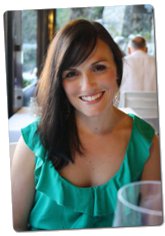I am a big fan of NPR. Although sometimes I can’t really concentrate on the story because of other distractions at work, I like to listen to podcasts and live streaming of NPR programs, when possible. I love to listen to it in the car and sometime I even listen to it when I run with the NPR app for the iPhone. Yesterday I came across a really interesting story and have to share it.
The program was called Jonah Lehrer: Passions of the Brain and was featured on Fresh Air. There is an audio story and a transcript for those of you who prefer to read vs. listen.
Basically, Lehrer is a science writer who is currently looking at how our brain reacts to decision-making. He speaks about a study done on how your brain reacts to making food choices when stressed. You can read/listen to the story for more details. (The study is very interesting!) The results showed that when your brain is stressed from many different option, whether that be food choices or something else non-food-related, you are significantly more likely to make poor food choices.
This is such a revelation for me! I do this! When I get stressed out at work because I have something I don’t want to work on or the task is complex and requires major thought, I often feel the need to stop for a snack. It’s like one minute I’m not the slightest bit hungry, then the next minute I have to eat something or I just can’t go on – I can’t make a decision on my next step in accomplishing the task. I don’t think it’s that I’m caught up in my task and don’t realize I’m hungry. As I often joke, I like to know where my next meal is coming from and I don’t skip meals. I’m pretty in-tune with my body when I start to feel hungry. I really think it’s the stress that is causing me to feel “hungry” and not the actual absence in my belly. I’m not necessarily always making poor or indulgent choices, but this is usually because I don’t keep these choices around my office. In the past, I have made these kind of choices when they’re available. Helpful to this is that I usually don’t have cash on me to make a run to the cage of processed crap snack machine.
But even still, it happens. I’m eating when I’m not hungry,which is not intuitive eating and sets me up to get ravenously hungry for dinner if I’m eating early in the afternoon and not maintaining a level blood sugar level.
The science behind this is really interesting. To make a long story short, when there are a lot of options and a decision is difficult to make, it is possible for a war to go on in the cortex part of your brain. Part of your brain is trying to process all the different options you have and another part is processing what you emotionally want (what you truly want), in this case food. The “war” going on can make everything fuzzy so you’re not able to fully utilize your decision-making skills in the same way you would if your brain was not stressed by the overload of information and feelings. This is when you are likely to make a food choice you wouldn’t normally make if you were relaxed and more cognizant of what you actually wanted, be it the healthier option or that you’re really not hungry at that moment (like in my case).
The program does not conclude with any real tips on how to overcome this “war in your brain”, although Lehrer does point out the importance of being aware of this, much like the message in the book, Intuitive Eating. I agree with this synopsis of the issue – sometimes just being aware of what the problem is and where it stems from is enough to help me be more mindful of my choices and ultimately make better choices.
Something to definitely keep in mind the next time you find yourself with an urge to “stress eat”.


